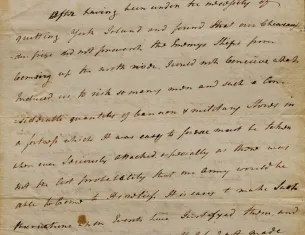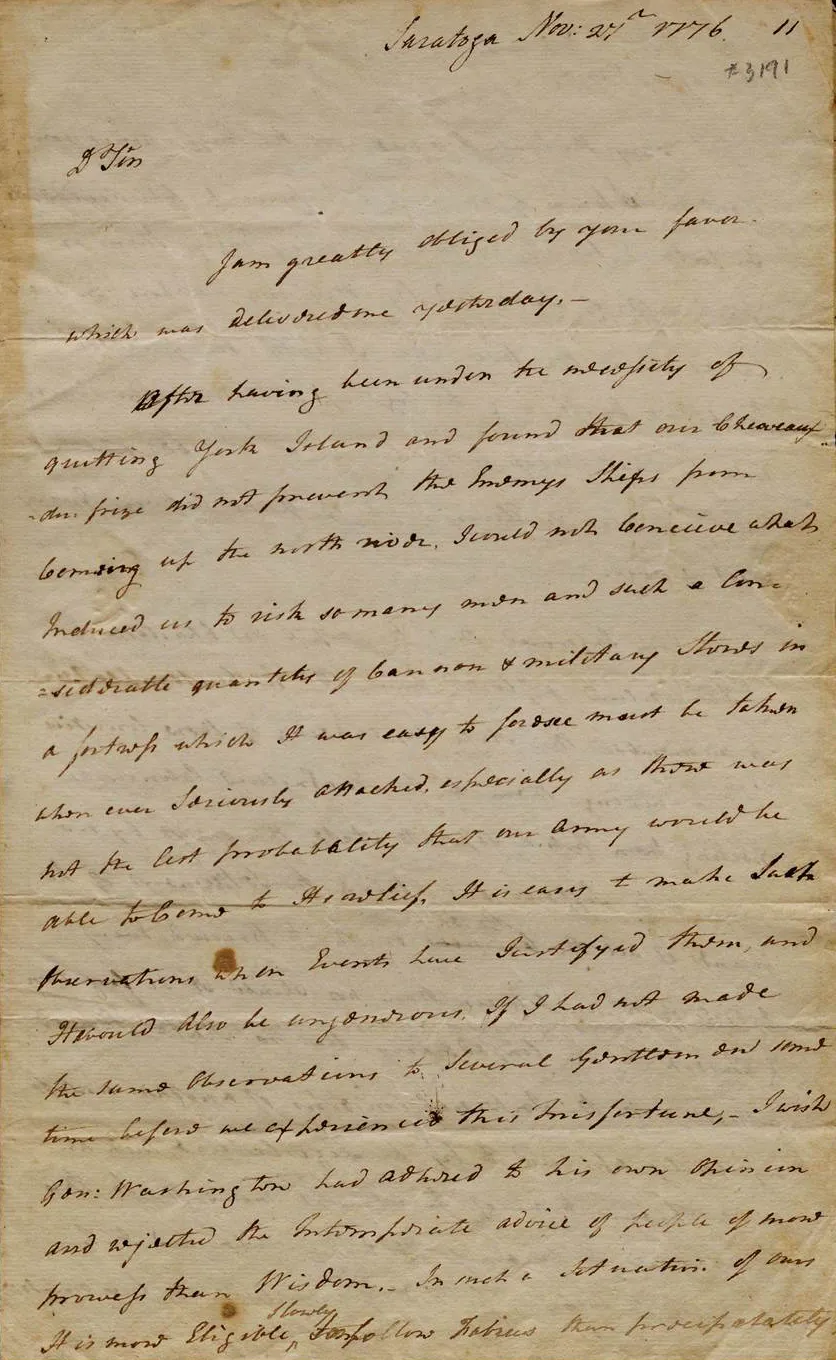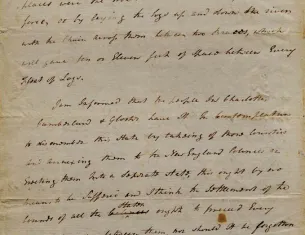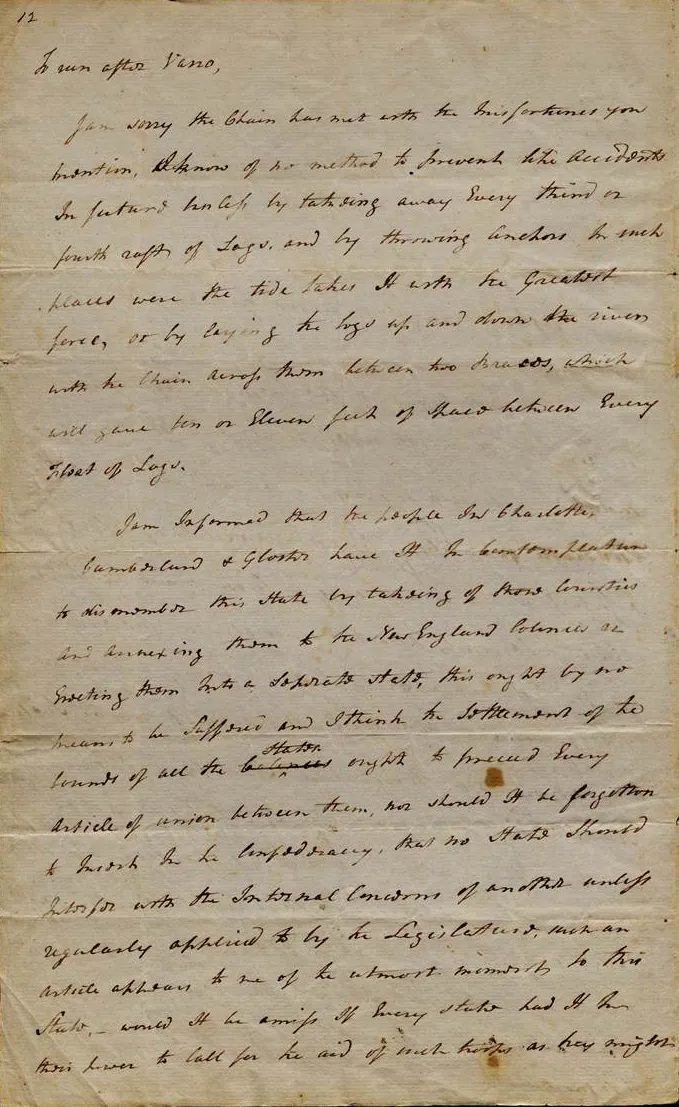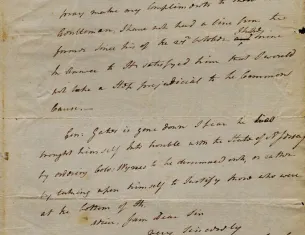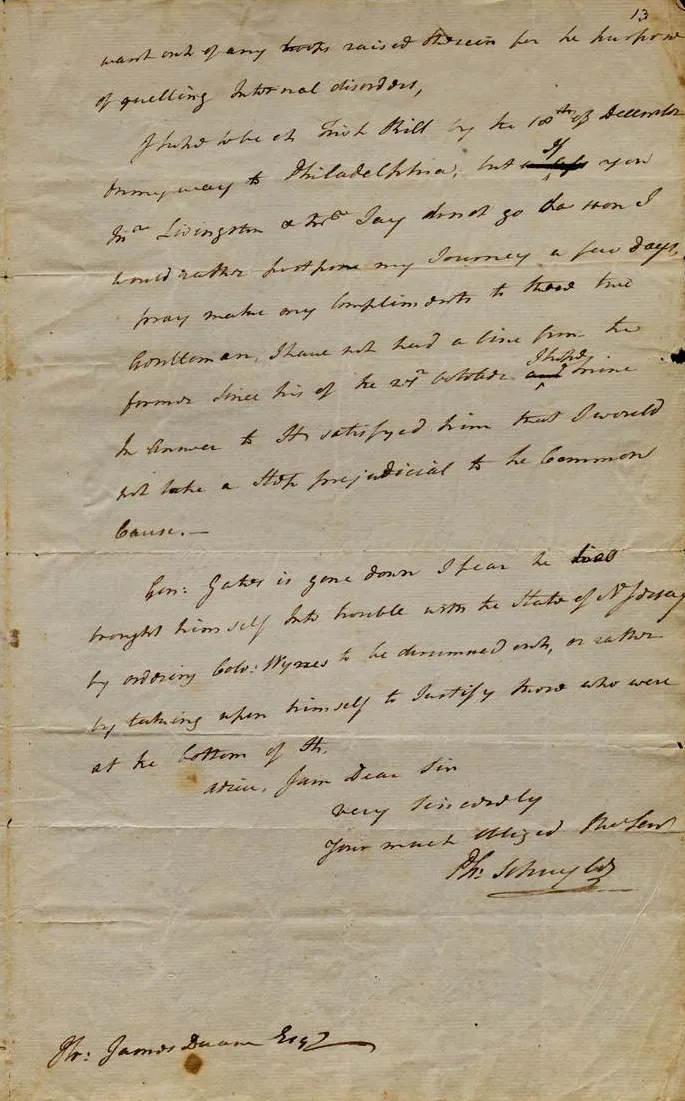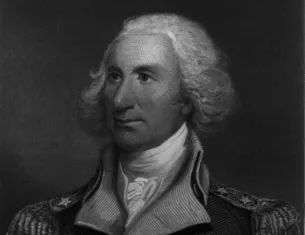General Schuyler on the Loss of Forts Washington and Lee, 1776
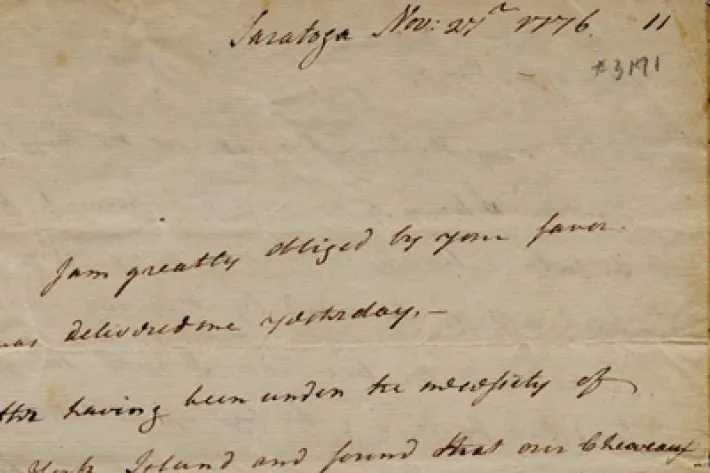
Philip John Schuyler to James Duane, November 27, 1776 (The Gilder Lehrman Institute of American History)
In this letter written on November 27, 1776, Philip Schuyler responded to news of the loss of Fort Washington on York Island (Manhattan) on November 16, 1776, along with military stores, and food and other supplies across the Hudson (or North) River at Fort Lee four days later. George Washington had almost been lost during the battle for Fort Washington. The defeats devastated the morale of the Continental Army and all patriotic citizens. At this time Schuyler was in command of the Northern Department of New York, headquartered in Albany, and had received the news from James Duane, a New York delegate to the Continental Congress.
A Letter from Philip J. Schuyler to James Duane, November 27, 1776
Saratoga Nov 27th, 1776.
Dr Sir
I am greatly obliged by your favor which was delivered me yesterday, –
After having been under the necessity of quitting York Island and found that our Cheaveaux du frize did not prevent the Enemys Ships from coming up the north river, I could not Conceive what Induced us to risk so many men and such a Considerable quantity of Cannon & military Stores in a fortress which it was easy to foresee must be taken when ever Seriously attacked, especially as there was not the least probability that our Army would be able to come to its relief. It is easy to make Such Observations when Events have Justified them, and it would also be ungenerous. If I had not made the same Observations to Several Gentlemen in some time before we experienced this Misfortune,- I wish Gen: Washington had adhered to his own opinion and rejected the Intemperate advice of people of more prowess than Wisdom. - In such a Situation: of ours it is more Eligible slowly to follow Fabius than precipitately to run after Vano,
I am sorry the Chain has not with the misfortune you intention, I know of no method to prevent like accidents in future unless by taking away Every third or fourth raft of logs, and by throwing another in such places were the tide takes it with the greatest force, or by laying the logs up and down the rivers with the chain across them between two Bracos which will give ten or eleven feet of Guard between Every Float of Logs. I am informed that we people in Charlotte, Cumberland & Gloster have it in contemplation to dismember this state by taking of those Counties and annexing them to the New England Colonies as meeting them into a separate state, this ought by no means, to be Suffered and I think the Settlement of the bounds of all the states ought to proceed Every article of union between them, nor should it be forgotten to much in the Confederacy that no state should [illegible] with the Internal Concerns of an other unless regularly applied to by the Legislature, such an article appears to me of the upmost [illegible] to their States. – would it be amiss if Every state had it in their power to call for the aid of much troops as hey might want out of any troops raised therein for the purpose of quelling internal disorders, I will which First I will by the 100th of December on my way to Philadelphia, but if you Mr Livingston & Mr Jay do not go to then I would rather postpone my Journey a few days, pray make my Compliments to these two Gentlemen, I have not had a line from the former since his of the 24th October I hope mine in Answer to It satisfyed him that I would not take a stop prejudicial to the Common Cause.- Gen: Gates is gone down I fear he has brought himself into trouble with the state of N Jersey by ordering Colo: Wymes to be dummed only, or rather by taking upon himself to justify those who were at the bottom of it.
Adieu, fair Dear Sir
Very Sincerely Your much obliged [illegible] Serv Ph: Schulyer
Source: Philip J. Schuyler to James Duane, November 27, 1776, The Gilder Lehrman Institute of American History, GLC02544.
A Letter from Philip Schuyler to James Duane, November 27, 1776
Saratoga Nov 27th, 1776.
D Sir
I am greatly obliged by your favor which was delivered me yesterday, –
After having been under the necessity of quitting York Island and found that our Cheaveaux du frize did not prevent the Enemys Ships from coming up the north river, I could not Conceive what Induced us to risk so many men and such a Considerable quantity of Cannon & military Stores in a fortress which it was easy to foresee must be taken when ever Seriously attacked, especially as there was not the least probability that our Army would be able to come to its relief. It is easy to make Such Observations when Events have Justified them, and it would also be ungenerous. If I had not made the same Observations to Several Gentlemen in some time before we experienced this Misfortune,- I wish Gen: Washington had adhered to his own opinion and rejected the Intemperate advice of people of more prowess than Wisdom. - In such a Situation: of ours it is more Eligible slowly to follow Fabius than precipitately to run after Vano,
I am sorry the Chain has not with the misfortune you intention, I know of no method to prevent like accidents in future unless by taking away Every third or fourth raft of logs, and by throwing another in such places were the tide takes it with the greatest force, or by laying the logs up and down the rivers with the chain across them between two Bracos which will give ten or eleven feet of Guard between Every Float of Logs . . .
Adieu, fair Dear Sir
Very Sincerely
Your much obliged [illegible] Serv
Ph: Schulyer
Source: Philip J. Schuyler to James Duane, November 27, 1776, The Gilder Lehrman Institute of American History, GLC02544.
Cheaveaux du frize - defensive structure created for the purpose of slowing enemy movement
Intemperate - excessive, extreme
prowess - skill or expertise
Fabius - Roman general who succeeded by avoiding battles and head-on assaults
Vano – vanity
Background
In this letter written on November 27, 1776, Philip Schuyler responded to news of the loss of Fort Washington on York Island (Manhattan) on November 16, 1776, along with military stores, and food and other supplies across the Hudson (or North) River at Fort Lee four days later. George Washington had almost been lost during the battle for Fort Washington. The defeats devastated the morale of the Continental Army and all patriotic citizens. At this time Schuyler was in command of the Northern Department of New York, headquartered in Albany, and had received the news from James Duane, a New York delegate to the Continental Congress.
Transcript
A Letter from Philip J. Schuyler to James Duane, November 27, 1776
Saratoga Nov 27th, 1776.
Dr Sir
I am greatly obliged by your favor which was delivered me yesterday, –
After having been under the necessity of quitting York Island and found that our Cheaveaux du frize did not prevent the Enemys Ships from coming up the north river, I could not Conceive what Induced us to risk so many men and such a Considerable quantity of Cannon & military Stores in a fortress which it was easy to foresee must be taken when ever Seriously attacked, especially as there was not the least probability that our Army would be able to come to its relief. It is easy to make Such Observations when Events have Justified them, and it would also be ungenerous. If I had not made the same Observations to Several Gentlemen in some time before we experienced this Misfortune,- I wish Gen: Washington had adhered to his own opinion and rejected the Intemperate advice of people of more prowess than Wisdom. - In such a Situation: of ours it is more Eligible slowly to follow Fabius than precipitately to run after Vano,
I am sorry the Chain has not with the misfortune you intention, I know of no method to prevent like accidents in future unless by taking away Every third or fourth raft of logs, and by throwing another in such places were the tide takes it with the greatest force, or by laying the logs up and down the rivers with the chain across them between two Bracos which will give ten or eleven feet of Guard between Every Float of Logs. I am informed that we people in Charlotte, Cumberland & Gloster have it in contemplation to dismember this state by taking of those Counties and annexing them to the New England Colonies as meeting them into a separate state, this ought by no means, to be Suffered and I think the Settlement of the bounds of all the states ought to proceed Every article of union between them, nor should it be forgotten to much in the Confederacy that no state should [illegible] with the Internal Concerns of an other unless regularly applied to by the Legislature, such an article appears to me of the upmost [illegible] to their States. – would it be amiss if Every state had it in their power to call for the aid of much troops as hey might want out of any troops raised therein for the purpose of quelling internal disorders, I will which First I will by the 100th of December on my way to Philadelphia, but if you Mr Livingston & Mr Jay do not go to then I would rather postpone my Journey a few days, pray make my Compliments to these two Gentlemen, I have not had a line from the former since his of the 24th October I hope mine in Answer to It satisfyed him that I would not take a stop prejudicial to the Common Cause.- Gen: Gates is gone down I fear he has brought himself into trouble with the state of N Jersey by ordering Colo: Wymes to be dummed only, or rather by taking upon himself to justify those who were at the bottom of it.
Adieu, fair Dear Sir
Very Sincerely Your much obliged [illegible] Serv Ph: Schulyer
Source: Philip J. Schuyler to James Duane, November 27, 1776, The Gilder Lehrman Institute of American History, GLC02544.
Excerpt
A Letter from Philip Schuyler to James Duane, November 27, 1776
Saratoga Nov 27th, 1776.
D Sir
I am greatly obliged by your favor which was delivered me yesterday, –
After having been under the necessity of quitting York Island and found that our Cheaveaux du frize did not prevent the Enemys Ships from coming up the north river, I could not Conceive what Induced us to risk so many men and such a Considerable quantity of Cannon & military Stores in a fortress which it was easy to foresee must be taken when ever Seriously attacked, especially as there was not the least probability that our Army would be able to come to its relief. It is easy to make Such Observations when Events have Justified them, and it would also be ungenerous. If I had not made the same Observations to Several Gentlemen in some time before we experienced this Misfortune,- I wish Gen: Washington had adhered to his own opinion and rejected the Intemperate advice of people of more prowess than Wisdom. - In such a Situation: of ours it is more Eligible slowly to follow Fabius than precipitately to run after Vano,
I am sorry the Chain has not with the misfortune you intention, I know of no method to prevent like accidents in future unless by taking away Every third or fourth raft of logs, and by throwing another in such places were the tide takes it with the greatest force, or by laying the logs up and down the rivers with the chain across them between two Bracos which will give ten or eleven feet of Guard between Every Float of Logs . . .
Adieu, fair Dear Sir
Very Sincerely
Your much obliged [illegible] Serv
Ph: Schulyer
Source: Philip J. Schuyler to James Duane, November 27, 1776, The Gilder Lehrman Institute of American History, GLC02544.
Cheaveaux du frize - defensive structure created for the purpose of slowing enemy movement
Intemperate - excessive, extreme
prowess - skill or expertise
Fabius - Roman general who succeeded by avoiding battles and head-on assaults
Vano – vanity
